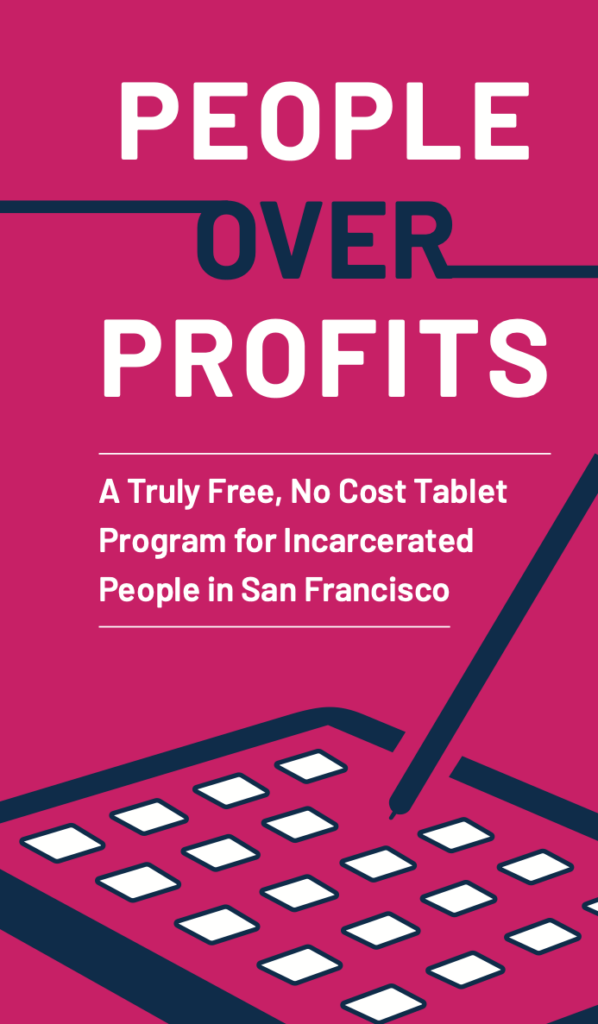
For the first time ever, the San Francisco County Jail is offering the use of tablet computers with free content to almost all people incarcerated in its two facilities. The program was created by the S.F. Sheriff’s Department, and is operated in partnership with the S.F. Mayor’s Office; the S.F. Public Library; the S.F. Treasurer’s Office Financial Justice Project; and the San Francisco Jail Justice Coalition, a coalition of community groups. The Mayor’s Office supports the program with $500,000 each year from the General Fund.
While other prisons and jails across the U.S. offer tablet computers, they charge fees for their use. According to People Over Profits – an issue brief about the tablet program published by the S.F. Treasurer’s Office Financial Justice Project – people who are offered tablet computers in other correctional facilities can be charged as much as $1.25 for each email sent and $25 to watch a movie. San Francisco’s is the first completely free tablet program in the nation. And the S.F. Public Library is the first public library to be able to offer free library resources on tablets.
San Francisco, in fact, passed a People Over Profits ordinance in 2020 that prohibits the city from making money on the goods and services provided to the people incarcerated in its two jails. County Jail No. 2 on 7th St. in San Francisco houses 392 people, and County Jail No. 3 in San Bruno houses up to 768 people.
Here’s how the tablet computer program works
“When the SF Sheriff’s Dept. put out a request for proposal, they said that the tablet provider had to work with the public library to make free resources available. The tablet vendor that was selected is Nucleos, and they had to do a lot of backend work with hoopla,” says Rachel Kinnon, the S.F. Public Library’s Jail and Reentry Services Supervisor. Hoopla is the library’s ebook partner vendor.
The S.F. Public Library staff selects the books that can be checked out on the tablets. Because of jail content restrictions, only certain books and audio books are available, not the entire collection, according to Kinnon. Prisoners can also access Pluto TV and a music app, as well as a portion of Wikipedia. They can also take online life skills classes and special courses created for people who are incarcerated. These include topics such as anger management and parenting.
The S.F. Public Library is paying for the hoopla books checked out on the tablets. “We’re considering incarcerated patrons to be library users, and we’re paying for them. The money comes out of the general library fund,” says Kinnon.
The tablet program is a huge step toward information equity for people who are incarcerated.
Rachel Kinnon
“Everybody in the jail, except for people in the most restricted lockups, gets the tablet for free, every day for most of the day. Each morning there’s a cart of tablets brought into every living area and distributed to the patrons. They’re collected at the shift change and charged and handed out again in the afternoon,” Kinnons says. “People don’t need a library card to log into hoopla. Users are authenticated if they’re logging in from the jail IP address.”
The tablets complement the library’s physical book delivery service. “We are being very clear that we will also provide in-person library service. Many people prefer a physical book. The tablets are collected at night, and the books they can keep,” she adds.
In addition to being able to provide books on the tablets, the S.F. Public Library brings a book cart into the two prisons. Librarians provide reader advisories about books, and each person incarcerated can check out two books at a time and keep them for as long as they’d like. They also provide talking book cassettes that go into a special device.
Tablet computers provide positive impact
What does the tablet program mean for the S.F. Public Library?
“The tablet program is a huge step toward information equity for people who are incarcerated,” says Kinnon. “One of the real impacts of incarceration is that people aren’t getting experience with technology. We had one patron who has been incarcerated for 10 years write some feedback to us. He said that his children are using iPhones and tablets, and he doesn’t even understand what an app is. But this is giving him experience in learning technology.”
“It’s been a real testament to the sheriff’s department that they have made a priority to have library materials available to people who are incarcerated and to make more resources available to people inside.”


